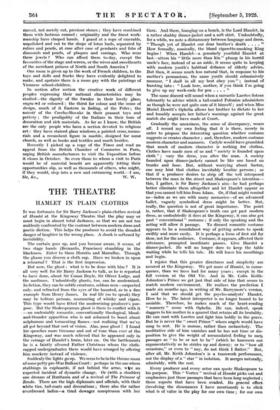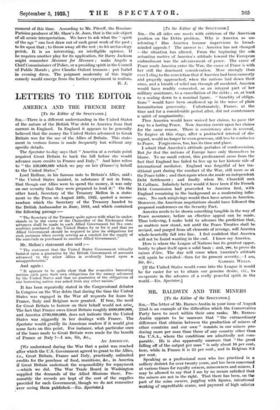THE THEATRE
HAMLET IN PLAIN CLOTHES
IT was fortunate for Sir Barry Jackson's plain-clothes revival of Hamlet at the Kingsway Theatre that the play may or must begin in almost total darkness, so that we are not too suddenly confronted by the contrast between modern dress and poetic diction. This helps the producer to avoid the dreaded danger of laughter in the wrong place. A shock is softened by invisibility.
The curtain goes up, and you become aware, it seems, of two stage hands (Bernardo, Francisco) stumbling in the blackness. Enter to them Horatio and Marcellus. Through the gloom you discern a cloth cap. Have we broken in upon a rehearsal ? That is the first impression.
But now, the ghost : what is to be done with him ? It is all very well for Sir Barry Jackson to talk, as he is reported to have done, about Sir Conan Doyle, Sir Oliver Lodge, and the mediums. Undoubtedly ghosts, too, can be modernized. In fiction, they can be subtle creatures, seldom seen—suspected only. and refracted from the eyes of the haunted, as in a fine example from Henry James. In real life (so to speak) they may be tedious persons, murmuring of whisky and cigars. This type would have fitted the modernizing producer's pur- pose. But the Shakespearean ghost is there to conflict with it • —an undeniably romantic, conventionally theological, blood- and-thunder apparition who is not ashamed to boast about sulphurous and tormenting flames—not realizing that we've all got beyond that sort of vision. Alas, poor ghost l I found his speeches more tiresome and out of tune than ever at the Kingsway, and was much relieved that he appeared only in the coinage of Hamlet's brain, later on. On the battlements he is a faintly silvered Father Christmas whom the cloth- capped undergraduates there would have wronged by offering him mockery instead of violence.
Suddenly the lights go up. We seem to be in the throne-room of some petty pre-War Balkan Court : perhaps in the one where stabbings in cupboards, if not behind the arras, w fre an expected incident of dynastic change. Or (with a shudder) one dreams of Ruritania and of a revival of The Prisoner of Zenda. There are the high diplomats and officials, with their white ties, tail-coats and decorations ; there also the rather overdressed ladies—a tired dowager conspicuous with her tiara. And there, lounging on a bench, is the Lord Hamlet, in a rather shabby dinner-jacket and a soft shirt. Undoubtedly, for a while, we note a disharmony between language and dress. " Though yet of Tfamiet our dear brother's death . . . . " How formally, musically, the bland cigarette-Smoking King begins 1 When Hamlet—a genuinely youthful Hamlet at last—utters his " little more than kin " plump in his horrid uncle's face, instead of as an aside, it seems quite in keeping with modern youth's habitual defiance of elderly advice. But then, it seems much less natural that, in response to his mother's persuasions, the same youth should submissively murmur, "I shall in all my best obey you " ; instead of bursting into : " Look here, mother, if you think I'm going to give up my week-ends for you . . . . "
The same discord will sound when a sarcastic Laertes listens tolerantly to advice which a tail-coated Polonius administers as though he were not quite sure of it himself ; and when Miss Muriel Hewitt's Ophelia allows her brother to dictate to her and humbly accepts her father's warnings against the great match she might have made at Court.
Gradually the uneasiness, the sense of discrepancy, wears off. I record my own feeling that it is there, merely in order to propose the interesting question whether costume suggests or creates character ; and, therefore, modern costume modern character and manners. Carlyle would have grumbled that much of modern character is nothing but clothes. Clothes have made men of us and " society is founded upon cloth " ; vary the dress, you alter the man. A society founded upon dinner-jackets cannot be like one based on trunks and hose. But, without worrying about Sartor, one may hint that clothes inevitably localize persons ; so that if a producer desires to strip off the veil interposed between the man in the street and Shakespeare's intention— this, I gather, is Sir Barry Jackson's aim—he had perhaps better eliminate them altogether and let Hamlet appear so that you cannot tell him from Adam. Or, if that might remind us—laden as we are with many memories—of -an advanced ballet, vaguely symbolical dress might be better. But, really, the question is not of great importance. The point is, rather, that if Shakespeare's truth can get past modern dress, as undoubtedly it does at the Kingsway, it can also get past " conventional " costume ; if only the speaking and the acting will allow it passage. To discard romantic costume appears to be a roundabout way of getting actors to speak swiftly and more easily. It is perhaps a form of first aid for them, not for the audience. Costume, it appears, affected their utterance, prompted inordinate pauses. Give Hamlet a dinner-jacket. He will no longer dare to keep the table waiting while he tells his tale. He will leave his mouthings and begin.
I rejoice that this greater directness and simplicity are secured at the Kingsway. We get more of Hamlet, in conse- quence, than we have had for many years ; except in the full version at the Old Vic. And in Mr. Colin Keith- Johnston's Prince we get just that side of him that seems to match modern environment. He realizes the prediction I. made six months ago, in writing of Mr. Barrymore's version. I said that we should get the psycho-analysts' Hamlet. Here he is. The latest interpreter is no longer bound to be amiable. Therefore, he makes much of the heart-rending " nunnery " scene with Ophelia. He can, indeed, speak daggers to his mother in a quarrel that retains all its brutality. He can rant with Laertes and fight him boldly in the grave. But he is never the " sweet Prince " whom angels would have sung to rest. He is morose, rather than melancholy. The meditative side of him vanishes and he has not time or dis- position to give the weight of accumulated feeling to such passages as " to be or not to be " (which he hammers out argumentatively as he strides up and down); or to " how all occasions," or even to " nay, do not think I flatter." But, after all, Mr. Keith Johnston's is a teamwork performance, not the display of a " star " in isolation. It merges naturally, admirably, with the rest.
Every producer and every actor can quote Shakespeare to his purpose. This " Vortex " revival of Hamlet picks out and emphasizes just those passages that have been long neglected ; those aspects that have been. evaded. Its general effect (involving the dissonances I have mentioned) is to elicit what is of value in the play for our own time ; for our own
'moment of this time. According to-Mr. Pitoeff, the Russian- Parisian producer of Mr. Shaw's St. Joan, that is the sole object of all scenic interpretation. We have to ask what the spirit of the age " can best draw out of each great work of the past ; to fix upon that ; to throw away all the rest ; to let archaeology perish. It is an interesting, an intelligible opinion. If he requires another play for its application, Sir Barry Jackson might remember Measure for Measure ; make Angelo a Chief Commissioner of Police, or a presiding spirit in the Council of Public Morals ; give Claudio Oxford trousers ; put Isabel in evening dress. The poignant modernity of this tragic comedy would emerge from the further experiment in realism.
R. J.











































 Previous page
Previous page